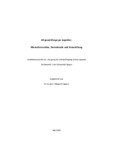Citation link:
https://nbn-resolving.org/urn:nbn:de:hbz:467-5003| DC Field | Value | Language |
|---|---|---|
| dc.contributor.author | Lingnau, Hildegard | - |
| dc.date.accessioned | 2019-09-02T09:58:30Z | - |
| dc.date.available | 2011-03-10T12:12:12Z | - |
| dc.date.available | 2019-09-02T09:58:30Z | - |
| dc.date.issued | 2008 | - |
| dc.description.abstract | Menschenrechte, Demokratie und Entwicklung wurden bisher als unterschiedliche Themen verstanden und entsprechend gehandhabt. Seit der Wiener Menschenrechtskonferenz von 1993 und den Diskussionen über Rights Based Approaches in den vergangenen Jahren ist diese Trennung verstärkt in Frage gestellt und die Entwicklung von menschenrechtlichen, auf Demokratisierung und auf (wirtschaftliche) Entwicklung zielenden Ansätzen in der Entwicklungszusammenarbeit gefordert und vorangebracht worden. In der vorliegenden Arbeit wird auf der Grundlage umfassender theoretischer Klärungen und multidisziplinärer Verortungen (Kapitel 2) die These vertreten, dass Menschenrechte, Demokratie und Entwicklung in einem komplementären Verhältnis zueinander stehen und sich gegenseitig verstärken ("all good things go together"). Dies hat Bedeutung in zweierlei Hinsicht. Erstens: für die Politikwissenschaften (konkret für entwicklungsländerorientierte, menschenrechtsbasierte Demokratietheorie und policy analysis) eröffnen sich neue Arbeitsfelder und Horizonte. Zweitens: in der Entwicklungszusammenarbeit sollte die Konzipierung und Umsetzung eines Menschenrechts- und Demokratisierungsansatz gefördert werden. Angesichts problematischer Rahmenbedingungen (suboptimal funktionierendes System des internationalen Menschenrechtsschutzes, Inexistenz eines globalen Regierungssystems etc.) (Kapitel 3) kommt es darauf an, den klassischen Herausforderungen mit innovativen Ansätzen zu begegnen. In Kapitel 4 werden einige empirisch recherchierte Herausforderungen und Ansätze aus verschiedenen Entwicklungsländern (v.a. aus Ruanda, Kambodscha und Südafrika) präsentiert und diskutiert. Es zeigt sich, dass vor Ort viel getan werden muss und viel getan werden kann. Dabei sind die Menschenrechte als Referenzsystem von großer Bedeutung. Sie lassen sich mithilfe der Pflichtentrias operationalisieren, die es ermöglicht, die jeweils entstehenden staatlichen Pflichten auf drei Ebenen (to respect, to protect, to fulfil) präzise zu benennen (Kapitel 5). Die Analyse der Erfahrungen, die verschiedene Akteure im Bereich Menschenrechts- und Demokratieförderung bereits gemacht haben (Kapitel 6) trägt ferner dazu bei, konkrete Ergebnisse auf normativer, analytischer und operativer Ebene zu identifizieren, die abschließend präsentiert werden (Kapitel 7). Neben der großen Herausforderung eines (neuen) Global Governance-Systems kommt es darauf an, Menschenrechte, Demokratie und Entwicklung in der Theorie wie in der Praxis stärker miteinander zu verbinden, damit ein virtuous cycle in Gang kommt (Kapitel 8). | de |
| dc.description.abstract | Human rights, democracy and development have been understood as different themes and handled accordingly. Since the Vienna Human Rights Conference of 1993 and the discussions on Rights Based Approaches in recent years, the separation is increasingly questioned and development cooperation has asked for and promoted approaches which combine human rights, democratization and (economic) development. Based on comprehensive and multidisciplinary theoretical clarifications (chapter 2) the present work presents the thesis that human rights, democracy and development are complementary and mutually reinforcing ("all good things go together"). This is important in two regards. First, new areas and horizons are opening up for political science (especially for human rights-based democratization theory and policy analysis in developing countries and development cooperation). Second, development cooperation should encourage and promote the development and implementation of a human rights and democratization approach. Given the difficult framework conditions (a suboptimal international system of human rights protection, non-existence of a global government system etc.) (chapter 3), it is important to tackle the traditional challenges with innovative approaches. In chapter 4, several empirically researched challenges and approaches from various developing countries (mainly from Rwanda, Cambodia and South Africa) are presented and discussed. It appears that much needs to be done and much can be done on the ground. Human rights are helpful to tackle these challenges as they provide an important reference system. Human rights can be operationalized by using the triad of obligations (to respect, to protect, to fulfil), which allows to specify state obligations at three levels (chapter 5). Furthermore, the analysis of experiences that various actors have already made in promoting human rights and democracy (chapter 6) helps to identify precise results at the normative, analytical and operational levels, which are presented in chapter 7. Beside the big challenge of a (new) global governance system, the challenge is now to combine more closely human rights, democracy and development in theory and in practice, so that a virtuous cycle gets under way (chapter 8). | en |
| dc.identifier.uri | https://dspace.ub.uni-siegen.de/handle/ubsi/500 | - |
| dc.identifier.urn | urn:nbn:de:hbz:467-5003 | - |
| dc.language.iso | de | de |
| dc.rights.uri | https://dspace.ub.uni-siegen.de/static/license.txt | de |
| dc.subject.ddc | 320 Politik | de |
| dc.subject.other | Menschenrechte | de |
| dc.subject.other | Menschenrechtsansatz | de |
| dc.subject.other | Armutsreduzierung | de |
| dc.subject.other | Development theory | en |
| dc.subject.other | Human Rights | en |
| dc.subject.other | Democracy | en |
| dc.subject.other | Development | en |
| dc.subject.other | Development Cooperation | en |
| dc.subject.swb | Entwicklungstheorie | de |
| dc.subject.swb | Menschenrecht | de |
| dc.subject.swb | Demokratie | de |
| dc.subject.swb | Entwicklung | de |
| dc.subject.swb | Entwicklungszusammenarbeit | de |
| dc.title | All good things go together : Menschenrechte, Demokratie und Entwicklung | de |
| dc.title.alternative | All good things go together : human rights, democracy and development | en |
| dc.type | Habilitation | de |
| item.fulltext | With Fulltext | - |
| ubsi.date.accepted | 2009-07-21 | - |
| ubsi.publication.affiliation | Fachbereich 1, Sozialwissenschaften - Philosophie - Theologie - Geschichte - Geographie | de |
| ubsi.subject.ghbs | OYB | - |
| ubsi.type.version | publishedVersion | de |
| Appears in Collections: | Hochschulschriften | |
Files in This Item:
| File | Description | Size | Format | |
|---|---|---|---|---|
| lingnau.pdf | 3.43 MB | Adobe PDF |  View/Open |
This item is protected by original copyright |
Page view(s)
735
checked on Jan 17, 2025
Download(s)
695
checked on Jan 17, 2025
Google ScholarTM
Check
Items in DSpace are protected by copyright, with all rights reserved, unless otherwise indicated.

